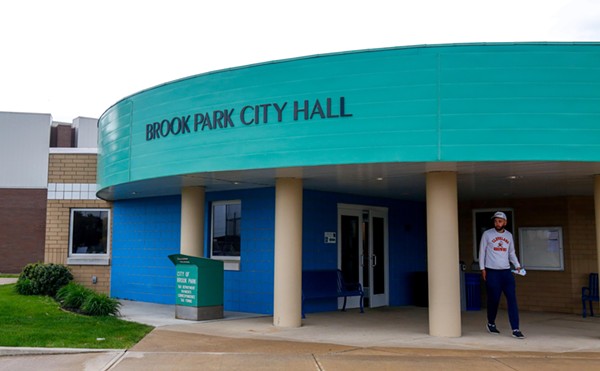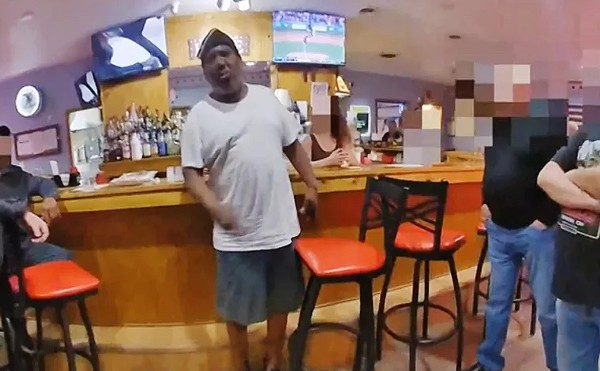As she drifted off, her mother swept into the room, a cloud of perfume and silk. She sat on her daughter's bed, smoothing the kinks in Lisa's short auburn hair.
"I have an idea," Joan said, smiling wickedly. "Let's forget school and play hooky today. Let's go on an adventure."
Lisa was wide awake now, clapping her hands. She loved adventures with Mom, and loved that her mother wasn't like the other moms she knew. They would never take their daughters out of school because they felt like it. But Lisa and her mom -- they had cake for breakfast that morning. Then they jumped in the car and drove to Cedar Point.
"Let's go on the big roller coasters," Lisa squealed, and they did. They sat in the front car, squeezing hands as the car rumbled up the tracks. They gasped for air, as if preparing for a long underwater dive, and as the car began to plummet, their hair flew behind them. After that, they had lunch: cotton candy and french fries.
That night, they stayed up late watching Johnny Carson. Lisa snuggled next to Joan in bed, and her mom kissed her head and laughed loudly. Cuddled there, Lisa felt a rush of love for her mother.
Even at eight, Lisa says, she knew this day hadn't been only about her. There was something not quite right with Mom, but whatever it was, smile-filled days like this seemed to make it disappear. It was then, Lisa says, that she vowed to do whatever she could to protect her mother. And earlier this year, when Mom and Daughter's lives went crashing down together in a crowded Cleveland courtroom, she kept that promise.
Joan Hoffmeister was just a kid when sparkling, flashy things took hold of her. Shiny pennies. Gaudy rings. Iridescent purses. She loved them all, but whenever her mother bought them, Joan fretted about losing them. So she hoarded every treasure, hiding them under her pillowcase and mattress. Eventually her mother, a devout Catholic housewife, asked about all the stuff stashed away in her daughter's room. "I like pretty things," Joan shrugged.
Her parents didn't know what to do with her. Kids like Joan -- troublesome, unpredictable, off -- were an embarrassment in their 1950s middle-class world. So they ignored the problem, prayed God would take care of it.
In 1959, Joan -- on Christmas break from her freshman year at Mercyhurst College -- met someone. Graham Hall, a former Rocky River High quarterback, was a midshipman at the U.S. Naval Academy. And he was smitten by her Barbie-doll features and Jane Fonda legs. He left for Annapolis after the break, but throughout the school year, the two exchanged long, soulful letters. Graham proposed at the Army-Navy football game his junior year. The day after he graduated, they married.
But the bliss didn't last. Graham was rigid and militaristic, Joan would later claim, and their relationship soured. (Graham wouldn't talk to Scene). And since she'd dropped out of college to marry him, she didn't know what to do with her days. So she spent her empty days meandering through the mall, waiting for something to catch her eye. Could be anything: a crystal ashtray. A porcelain-faced doll. A long, silky gown in Easter colors. Whatever it was -- whether she needed it or not -- she surreptitiously stuffed it in her bag.
At home, she hoarded her stolen treasures in the basement, wrapping them in tissue paper and hiding them in boxes. Over time, the boxes piled so high they blocked the windows. Graham, whose time was devoted to his family's lucrative printing business, was flummoxed by his wife's new hobby. Joan's whole life, it seemed, was stacked in her basement.
That changed, for a time, after Joan gave birth to her first daughter, in 1963. Lisa Marie was cuddly and precocious. Growing up, she worshiped her parents, especially her unpredictable mother. Some days, Lisa came home from school to find Mom's fingers covered in paint. Joan rushed her inside to show off the figures she'd hand-painted on the walls. They were house plans, her mother told her, for the castles they'd all live in one day. She encouraged Lisa to draw on the walls too. Then they ate ice cream for dinner.
But in a day, everything would change. Joan would spend all day in the kitchen, cleaning and organizing the kitchen's contents. If Lisa moved a can of peaches to a different shelf, Joan screamed like she'd been beaten. "I never knew which Mom I'd wake up to," Lisa says.
After a while, it became impossible to ignore Joan's illness. Closet doors were so overstuffed with merchandise, they wouldn't shut. You couldn't walk through the basement without tripping over boxes. When Joan wasn't feeding her children cake for breakfast, she was lying in bed all day, lights off and curtains closed. She'd eventually be diagnosed with schizophrenia, manic depression, and a slew of other mental disorders. But at the moment, no one knew what was wrong with her.
They only knew she was sick.
Around 1970, Graham had Joan admitted to Lakewood Hospital's psychiatric unit, where she went through shock therapy, she says. But when Joan came home three months later, her relationship with Graham only worsened. They stayed together a while longer, after Joan learned she was pregnant again. But not long after Bradley was born in 1971, they divorced. Joan ended up with primary custody of the kids. Graham, she claims, didn't want them.
With few practical skills and no steady income, Joan got a housekeeping job. But it was her looks that kept her afloat. As she moved into her 30s she was still beautiful, and men were irresistibly drawn to her. It wasn't long before one of her first customers, an old-money widower named Roger Neff, graduated to boyfriend status. A gentle-natured car lover, Roger ran a West Side mechanic's shop, and he suffered from his own sort of hoarding problem: He had a collection of Corvettes stored in his North Olmsted garage. Joan somehow persuaded him to sell the cars. They split the proceeds.
Roger, like other men would, loved Joan with an intensity that caused him to part with his money quite freely. But without close supervision, Joan had taken on the carefree persona of a teenager on spring break. Despite Roger's generosity, she soon moved on to other suitors. Lisa, still in elementary school, adapted to the role of housemother.
Early in the morning, Lisa arose to brew pots of strong, bitter coffee, hoping the smell might wake her mom in time to take her to school. When the shrubs outside their home grew scraggly and wild, Lisa learned how to use a clipper. When rain was imminent, Lisa learned how to install storm windows.
She also took on the role of Brad's surrogate mom. As her brother grew older, it was Lisa who made sure his homework was finished, Lisa who took him to church. "They were together so much, we joked that they were secret lovers," says Brad's best friend, Damon Ansell. When he was older, Brad would credit Lisa with making his childhood at least livable: "If it weren't for you, I would have had significantly fewer good memories, and the bad and unpleasant ones would have been awful and intolerable," he wrote in a letter to his sister.
As long as Lisa was at home, she was able to keep her tattered family together. "My heart aches when I think of how much effort and love you put into trying to make a 'family' out of your situation," Bob Titmus, an old family friend, wrote to her years ago. But at 18, Lisa went off to college. Joan and Brad were left alone.
As years passed, Joan began spending less and less time cleaning houses, and more and more time in the one place she loved: the mall. She also became educated in the relaxed return policies of retail stores. With piles of superfluous items lying around her house -- she was the hoarding ex-wife of a wealthy man, after all -- she began to wonder whether she could return them for cash. One day, she decided to test her luck.
She walked inside a large retailer, carrying a bag of new items, their tags still attached. She asked a cashier if she could get a refund, even though she had no receipt. She was going through a divorce, she said in her syrupy voice, and had lost the receipt. Could they refund the money anyway? Just this once?
She learned that day just how accommodating shops can be, especially to grieving, well-dressed divorcées. She began returning things in bulk, changing stores each time. At first, she was simply returning items she had bought or stolen over the years, the contents of her cluttered life. But like a mischievous toddler, she began testing boundaries. She started picking items off racks -- a cashmere sweater, for instance -- and slyly ripping off the alarm tags. She would then stroll to the service desk, helplessness dripping from her voice, and ask for a refund. Sympathetic cashiers, schooled in the art of nonconfrontation, credited her without question.
The more time she spent "shopping," the more complex her schemes became. She learned the value of a copy machine. Some days, she would buy items -- say a coffee maker -- at a chain store. She'd then xerox the receipt and drive to the same store at a different location. There, she'd brazenly remove a new coffee maker from the shelf, approach the cashier with the xeroxed receipt, and hand over the coffee maker, expecting a refund. It worked -- so she did it over and over again, using multiple copies of the same receipt.
In her most advanced and lucrative endeavors, Joan would purchase two similar-looking items -- a $1,000 gold bracelet, for instance, and a $100 gold knockoff. Then she'd go home and switch the tags. Months later, she'd return with a receipt and the knockoff bracelet, reattached to a $1,000 price tag. Sales clerks, she correctly figured, weren't jewelry appraisers: They'd accept the returns without question. Joan would leave $1,000 richer -- and with a $1,000 bracelet waiting for her at home.
What began as stacking boxes had evolved into an elaborate buy-and-return scheme that, in the end, would cross 28 states and leave law-enforcement officials shaking their heads at its brilliance. And it would provide Joan with millions of dollars in assets. Yet through it all, she lived like a poor person. She wore thrift-store clothes, drove a beat-up 1970s Oldsmobile, and went dumpster-diving behind Panera Bread for food. And when it came time for the neighborhood garage sale, she told neighbors she didn't have the $5 community fee to participate -- although she did have some nice things to sell. The neighbors let her put some stuff out anyway. Only later did they discover that the perfumes Joan sold had been diluted with water.
Like most loss-prevention officers, Keith Thompson was tired of his stores getting ripped off. Tired of people returning stuff they'd already used, of little shits manipulating the system. But his stores were on an uneven playing field, with technology decades old. So in the fall of 2005, Thompson, head of security for Sears, installed a new software system in the Richmond Heights store that would instantly flag suspicious refund transactions. He figured it would give him the upper hand in the fight against pants-stuffing teenagers. But his new purchase was worth much more.
That October, Joan, then 64, walked into the Richmond Heights Sears to return a recently "purchased" vacuum. The customer service rep credited Joan's credit card the price of the vacuum, and she calmly walked out of the store. But upstairs, in the security office, the new software went to work: Sears had reimbursed Joan $6,000 in the last year, it showed. Either Joan Hall was one mighty picky shopper, or she was up to something.
Thompson called Richmond Heights Detective Chuck Duffy and asked him to investigate. Duffy, a big man with coal eyes and a snide smile, agreed. He took his time heading out; mild-mannered retirees aren't the most interesting perps. But a few days later, the detective meandered over to Joan's Westlake house. The treelined suburban street was quiet that afternoon. When the detective knocked on the door of Joan's split-level, nobody answered. So he went around back and poked his head inside. In the house, he saw stacks of boxes, piled toward the ceiling. It looked like a department-store stockroom.
"It just didn't look normal," he says.
Back at his office, Duffy worked the phones, investigating Joan's credit-card transactions. And he found the strangest thing: The card had $56,000 in credit on it. And most of the credit came from giant retail stores around Cleveland. Duffy's adrenaline surged. The case of the return-happy retiree had just taken a turn toward interesting.
He studied Joan's credit history: The biggest refunds, he saw, came from TJ Maxx, so he dialed the head of the corporation's loss-prevention department, William Dammerall. The name "Joan Hall" stung Dammerall's ears. She'd twice been arrested at their stores for shoplifting. "We've been looking into Joan for years," he said.
Duffy now had the evidence he needed to arrest Joan. He headed back to Westlake and found her sitting in her backyard garden. He quietly handcuffed her. As they rode to the station, Joan acted like the two were best friends. "She was just the nicest person there was," Duffy says. She told him she was "sick," and that she only "did this because I don't have any money." And, she said, because she was dying of cancer.
As Joan was being booked into jail, Duffy obtained a search warrant, drove back to her home, and pounded down the door. Inside, the place was "like a retail factory." You couldn't move through the house without stumbling into boxes. The closets were overstuffed with clothes. The garage had enough canned goods to feed a city of homeless people.
In a locked box, Duffy found $51,000 in cash, numerous legal documents, and the keys to five different safety-deposit boxes. He piled what he could into the back of his car and headed to the banks. "That's where we found the mother lode," he says.
Inside the boxes, detectives uncovered more than $1.3 million. Stacks of thousands of bills were shrink-wrapped together and attached with handwritten notes: "For Lisa," "For Brad." There was also an endless assortment of diamonds, bracelets, and gems -- a Tiffany's display window tucked inside small safe-deposit boxes.
Back at the police station, Joan was calm, smooth, like she'd been pulled over for a speeding ticket. She'd been arrested before, after all. So she did what she always did in cases of emergency: She called Lisa.
But Lisa, for once, wouldn't be available to protect her mom.
Though Lisa's childhood was tumultuous at best, it hadn't constrained her when she escaped Westlake. After graduating from Denison College in 1985, she studied at the prestigious London School of Economics and eventually took a job as director of marketing for the ICH Corporation. The job was in Louisville -- back in the States, but safely away from Cleveland.
"I think, subconsciously, Lisa was trying to create a border, yet still remain somewhat accessible," says friend Nancy McDonnell. "I think she was in a way attempting to create a life on her own . . . We all thought this was a good thing."
Lisa spent a year looking at houses before deciding on a hundred-year-old historic home. But she awoke on Sunday mornings missing the excitement of looking for a home: the open houses, the constant search for deals. Soon she found another historic home in need of renovation. So she put her recently purchased house on the market and sold it for a solid profit. Like that, real estate became a side hobby, the way marathoning or cooking is for others. "I love that it's a creative outlet and that it's so tangible," Lisa says. "You see something that needs fixing up, and you do it -- and then you see how beautiful it has become."
In 1993, when ICH moved its headquarters to Dallas, Lisa decided to stay in Louisville. She began to practice real estate full-time. The bank's generous severance helped Lisa get started. But she needed more cash. Her mom gladly helped, and Lisa began a successful run investing in real estate. She thought nothing of taking her mom's money, she says.
But 12 years later, on Thanksgiving eve 2005, Lisa was in her kitchen when two men approached her door in long, black jackets -- odd attire, she thought, for a warm fall day. As she went out to greet them, they unzipped their jackets to reveal silver federal-marshal badges.
"Do you know what we're here for?"
Lisa shook her head.
"It's big," one told her. "Really big."
They escorted her to the Jefferson County Jail. Lisa, who had no previous criminal record, spent two nights behind bars.
As prosecutors had unraveled Lisa's mom's schemes, they'd been astounded by the breadth of her enterprise. Assistant Cuyahoga County Prosecutor James Gutierrez, a 21-year veteran, had gone after CEOs and expert con artists, but he'd "never seen anything like this case before."
During his year-long investigation, Gutierrez discovered that Joan, using various aliases, had acquired hundreds of different credit cards. She'd amassed more than $323,000 in credit on the cards in six years, withdrawing cash from the cards as needed. "It was quite impressive," Gutierrez says drily.
But what irked the prosecutor most was that despite her wealth, Joan was living off of taxpayers, receiving $500 a month in Social Security benefits, plus government subsidies to pay her utility bills. And the legal witness on each government form was her London School-educated daughter.
Lisa became a focus in Gutierrez's investigation. While she was being arraigned, Duffy and other officers ransacked her Louisville home, grabbing everything from financial documents to an essay she'd written to get into law school. When they found Lisa's credit reports, some of the credit cards listed were being used by Joan. And they found that Lisa had legal access to Joan's many security boxes -- proof, prosecutors say, that Lisa had knowledge of her mother's illegal doings. They also believed she had invested stolen money in her lucrative real-estate business. They called her a "laundress."
"Over a 15-year period," Gutierrez says, "Lisa laundered money and hid stolen money to her benefit, and her mother's benefit."
There was, however, one small hole in their case: A handwriting expert told prosecutors that Lisa's signatures on Joan's government forms had been forged -- by Joan. And if prosecutors were going after Lisa, they'd have to go after Brad. He'd also had access to the boxes.
So prosecutors suggested a deal to the siblings: Testify against your mother, and we'll offer you leniency. Lisa refused. "I could barely believe that the prosecution could even suggest it, let alone believe that I -- or anyone -- would agree to testify against their own mother," she says. "It was a morally reprehensible proposition."
That November, Lisa was indicted on eight felony counts, including racketeering, money laundering, and theft. Her mom's indictment was even more daunting: 79 felony counts, including theft, forgery, and record-tampering. They were hefty, hope-ending allegations, but what pierced Joan's heart most was the prosecutor's pursuance of her daughter. "I wanted life to be a smorgasbord of opportunities for Lisa," she says. "I'd give anything to go back and be able to do my life over."
Until the day of the trial, Lisa remained optimistically, perhaps naively, hopeful about her fate. But she looks worn on this first day of March, when she, Joan, and Joan's paramour Roger Neff, accused of aiding in her schemes, go on trial together. Her brilliant blue eyes are overcast. Her petite frame carries 30 excess pounds -- the effect of stress-eating her way through bag after bag of potato chips. She looks ages away from the eight-year-old girl who barreled down coasters and binged on sugary mounds of candy with her mom.
Still, Lisa worries mostly about her mother. Joan hobbles into the courtroom with a cane; her long gray hair is an untamed jungle. She looks as vulnerable and helpless as a fever-stricken child. Lisa shoots her mom the most encouraging smile she can muster.
During opening arguments, Gutierrez, a sharp-nosed prosecutor with a natural swagger and well-tailored suit, claims that Joan and Lisa were "co-conspirators" in a "well-thought-out" enterprise to bilk millions out of retailers. "Joan Hall stole the money, and Lisa laundered it," he tells the judge.
His arguments are largely circumstantial. He can't prove that all $2 million of money and jewels was stolen -- a fact he acknowledges. He can, however, show a pattern, dating as far back as Joan's credit-card records go, of excessive returns. And for the judge charged with determining the women's fate, Gutierrez has brought colorful graphs that illustrate Joan's burgeoning bank accounts.
There's also her history of petty theft. William Dammerall, the TJ Maxx "loss-prevention expert," takes the stand to recall a conversation he had with Joan. "She told me this was her job, and this was how she made a living," Dammerall had recently written in a police report, "She had done fraudulent refunds all over." She even asked if he thought she'd make a good guest on Oprah, Dammerall says.
At the defense table, Lisa's attorney, Mark Stanton, scribbles notes to Lisa, furious at the trial's progress. If only Lisa would testify, he thinks. She's a credible witness, he believes, compelling when she speaks. But Lisa refuses. Mom and daughter are being tried together -- if she talks about her own case, she'll be questioned about her mother. She won't do it, she says, even if it turns out to be "of detriment to my personal well-being."
So Stanton does his best. He explains that while all these claims may be true of Joan, Lisa is innocent in the exchange. Yes, she invested her mother's money, but prosecutors are assuming the money Lisa used was illegally obtained. Joan had many wealthy patrons in her life, he says, and Joan's in-laws had been rich too.
It's a strong argument, Stanton thinks. But then Lisa's little brother takes the stand.
Lisa never believed Brad would take the prosecutor's deal. He's changed in recent years, sure -- going from a successful go-getter to a lackluster drifter. He's dropped out of law school and has no job. He's cut himself off from his family. Still, Lisa has never stopped trying to take care of her brother. She's flown out to Washington, even paid for a drug-intervention session that went bad. "Where everyone else -- including me -- have given up on Brad, Lisa keeps fighting," says Brad's ex-best friend, Damon Ansell.
But there he is, pushing through the courtroom doors. Lisa turns and gasps. Her brother, thin as a dandelion stem, with shifty eyes and chapped skin, takes the witness stand. He tells the judge that everyone knew his mother was a criminal; he says Lisa admitted she was in on the racket. When Stanton asks if he'd ever been close to his sister, he replies, "Not really." And when Brad's testimony is over, he tells the judge that he believes Joan and Lisa should be sentenced to the harshest penalty allowed by law.
At the defense table, Lisa can't stop sobbing.
Six weeks later, Judge Nancy Fuerst returns the verdict: Lisa, Joan, and Roger Neff are found guilty of theft and money laundering. Joan is found guilty of dozens more counts involving theft, fraud, and tampering with records. The enterprise, the judge tells the defendants, was "very cleverly done, very well done."
They're sentenced one month later at an emotional hearing. Dozens of letters had arrived, pleading leniency for Lisa. "So many calls came in for Lisa, you'd think we arrested Mother Teresa," Detective Duffy says. Prosecutors have only disdain for the last-minute appeals. "The daughter had all the education in the world and every opportunity not to do this," Gutierrez says. "It was her decision to go down this road."
Fuerst sentences Joan to seven years in prison and orders her to pay back $1.57 million. Lisa gets three years, plus $40,000 in fines. She will eventually appeal the decision and be released while she waits to hear about her appeal.
"I guess I was naive," she says after the trial. Despite the evidence against her, she sounds stunned by the outcome. "I believed in the judge and I believed in the system and I believed that to be found guilty of a crime, you would at least know what it is you are being found guilty of."
On a recent Friday night, Lisa, wearing a sad smile, sits at a patio outside Saucy Bistro, an upscale Westlake restaurant, drinking in the sky. This, she knows, may be one of her last nights out for a while.
She breaks a piece of bread from the basket and rolls the dough between her fingers. "You know," she says, "I've spent -- willingly -- so much time and energy being available and supportive for my brother and mother. There was something in me that needed for them to be OK before I could move on fully with my own life. I did everything I could to make them both feel unconditionally loved."
The ironic part, she says, is that despite her efforts -- or perhaps because of them -- "these two people whom I love could not be any worse off."
On bad days -- which are most days -- Lisa says she sits in bed, wondering what she should have done differently. She winces when she thinks of the humiliation the case has brought her family, especially her father. "I used to dream about being the first woman president," she says. "And how proud my dad would be. Now my picture is in the paper, and it's not because my dreams came true."
But when her thoughts wander this way, Lisa says, she always comes back to the same place: If she were to redo her life, she'd do it exactly the same way. "You know," she says, "I'm the type of person who really believes that there is a meaning for every action, that everything in life happens for a reason." She blinks, and her eyes fill with tears. "I'm still trying, but for the life of me, I still can't find the meaning in this."













